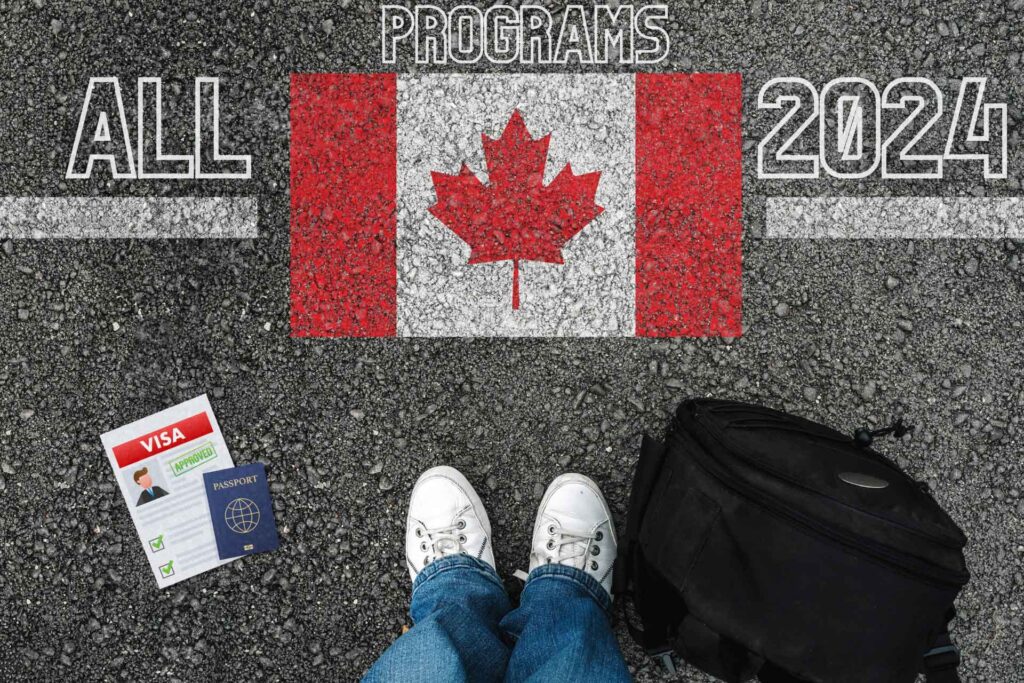In a world full of dreams and opportunities, Canada stands as an open door to those seeking a better life and new beginnings. The allure of this vast and diverse nation has captured the hearts of countless dreamers and doers, each yearning to embrace the Canadian dream.
As we venture into 2024, the quest for opportunities to immigrate to Canada is more enticing than ever.
Whether you’re a skilled professional, a loving family member, an entrepreneur, or a compassionate caregiver, Canada has designed a multitude of pathways to welcome you into its embrace.
In this article, we will dig into every way to immigrate to Canada, helping you find the best Canadian immigration program that best aligns with your aspirations and circumstances. Our aim is to empower you with the knowledge you need to navigate the intricate world of Canadian immigration programs with confidence and clarity.
Express Entry: Immigrate as a Skilled Worker
Express Entry is a flagship immigration program for skilled workers in Canada. The program follows a points-based system designed to identify individuals with high potential to contribute to Canada’s economy. It streamlines the application process and aims to provide a faster route to permanent residency.

Here’s a quick overview:
Federal Skilled Worker Program (FSWP): This program targets skilled individuals with valuable work experience. To qualify, candidates need to meet minimum language requirements, have a job offer or proof of funds, and pass a points assessment based on factors like age, education, work experience, language proficiency, and adaptability.
Federal Skilled Trades Program (FSTP): Geared towards individuals with experience in skilled trades, such as carpentry, plumbing, or electrical work. To be eligible, you must have a job offer in Canada, prove language proficiency, and have a minimum of two years of work experience in your trade within the past five years.
Canadian Experience Class (CEC): Ideal for those who already have work or study experience in Canada. You can qualify for this program if you have at least one year of skilled work experience in Canada, meet the required language proficiency levels, and plan to live outside the province of Quebec.
Express Entry uses the Comprehensive Ranking System (CRS) to evaluate candidates. Points are awarded based on factors like age, education, work experience, language skills, and adaptability. Applicants with the highest CRS scores are issued Invitations to Apply (ITAs) for permanent residency during regular draws from the Express Entry pool. It’s a competitive system, but for those who qualify, it offers a streamlined path to becoming a permanent resident of Canada.
Whether you’re a skilled worker in high-demand fields or possess unique skills that Canada seeks, Express Entry is a prominent avenue for you to consider.
Family Sponsorship: Unite with Your Loved Ones
The Family Sponsorship program in Canada allows Canadian citizens and permanent residents to sponsor their family members for immigration. This program promotes family reunification, enabling loved ones to live together in Canada.

Here are some key aspects of the program:
Who Can Be Sponsored: You can sponsor various family members, including your spouse, common-law partner, conjugal partner, dependent children, parents, grandparents, and other eligible relatives. Requirements may vary depending on the specific relationship.
Eligibility of Sponsors: As a sponsor, you must be a Canadian citizen, permanent resident, or registered as an Indian under the Canadian Indian Act. You need to meet certain financial and other eligibility criteria to ensure you can support the family members you’re sponsoring.
Responsibilities of Sponsors: Sponsors commit to providing financial support and care for the sponsored individuals. This commitment usually spans several years, depending on the relationship. The intention is to ensure that sponsored family members don’t require government assistance.
Processing Times: Processing times may vary based on the relationship between the sponsor and the sponsored individuals. Spouses, common-law partners, and dependent children often have shorter processing times compared to parents and grandparents.
Minimum Necessary Income (MNI): Sponsors must meet the Minimum Necessary Income (MNI) requirement. This financial threshold is updated annually and varies based on the number of family members in the household.
Sponsorship Agreement: The sponsor and the sponsored individual sign an agreement to confirm their commitment to one another. This agreement includes financial responsibilities.
Super Visa: Parents and grandparents of Canadian citizens and permanent residents may also be eligible for a Super Visa, which allows them to visit Canada for extended periods. Super Visas are generally valid for up to 10 years.
The Family Sponsorship program is a testament to Canada’s commitment to keeping families united. It’s a way for citizens and permanent residents to bring their loved ones to Canada and provide them with the opportunity for a better life.
Also Read: List of Countries That Allow Dual Citizenship And Which Do Not
Provincial Nominees: Embrace Regional Opportunities
The Provincial Nominee Program (PNP) is a Canadian immigration pathway that allows provinces and territories to select individuals who wish to settle in a particular region. Each province and territory in Canada, except for Quebec, has its own PNP.

Here’s an overview of this program:
Provincial Selection: Under the PNP, provinces and territories have the authority to nominate candidates who meet their specific economic and labor market needs. These candidates can be skilled workers, businesspeople, or semi-skilled workers.
Enhanced Pathways: The PNP includes various enhanced pathways, including those aligned with the federal Express Entry system, which manages applications for three federal economic immigration programs: Federal Skilled Worker Program, Federal Skilled Trades Program, and Canadian Experience Class.
Eligibility Criteria: To qualify for the PNP, candidates must have the skills, education, and work experience necessary to contribute to the economic development of the province or territory to which they are applying. Each province and territory sets its own eligibility criteria.
Express Entry-Aligned Streams: Some provinces have Express Entry-aligned streams within their PNPs. Candidates who receive a provincial nomination through these streams receive an additional 600 Comprehensive Ranking System (CRS) points, which effectively guarantee an Invitation to Apply (ITA) for permanent residence in the subsequent Express Entry draw.
Occupation in Demand: Many PNPs have specific streams that target occupations in high demand within their regions. Candidates working in these occupations may have a better chance of being nominated.
Regional Nomination: The PNP is a regional immigration program, meaning candidates must intend to live in the province or territory that nominates them. After receiving a provincial nomination, candidates must apply for permanent residence with the federal government.
Application Process: The PNP application process varies depending on the province or territory. Some have paper-based processes, while others use online systems.
Nomination Limits: Each province and territory has an annual limit on the number of nominations they can issue. Once this limit is reached, they may close some or all of their PNP streams until the next year.
The Provincial Nominee Program is an important pathway for immigrants who want to settle in specific regions of Canada. It provides an opportunity for provinces and territories to select candidates who will contribute to their local economies and communities. If you wish to live and work in a particular region of Canada, the PNP may be a suitable option for your immigration journey.
Quebec-Selected Skilled Workers Program (QSWP): Immigrate as a Skilled Worker in Quebec
If you’ve always dreamt of residing in the enchanting province of Quebec and you’re a skilled worker, this program is your gateway. Quebec has its own selection criteria, emphasizing proficiency in the French language.
The Quebec-Selected Skilled Workers Program (QSWP) is a unique immigration pathway tailored to the province of Quebec.

Here’s a brief overview of the program:
Provincial Autonomy: Quebec is the only province in Canada with full control over its immigration policies. It operates its own immigration selection system, separate from the federal Express Entry system.
Points-Based Selection: The QSWP employs a points-based system to select skilled workers who have the potential to integrate into the Quebec job market and society effectively. Points are awarded based on factors such as age, education, work experience, language proficiency, and more.
Regular Intake Periods: The program operates on a system of periodic intake periods when candidates can submit their applications. These intakes are subject to annual quotas, and interested applicants must be ready to apply during these specified periods.
Language Proficiency: Demonstrating proficiency in French is crucial for successful applicants to the QSWP. French language skills are highly valued, as Quebec places a strong emphasis on the use of the French language in daily life, work, and communication.
Areas of Training: The program takes into account an applicant’s area of training when assessing eligibility. Certain fields and occupations may have higher demand in Quebec, and applicants with training and experience in these areas may benefit from an expedited selection process.
Education: Educational qualifications play a significant role in the selection process. Points are awarded for higher levels of education, and candidates with a recognized diploma or degree from a Quebec educational institution receive additional points.
Work Experience: A candidate’s work experience is assessed based on the number of years worked and the nature of the occupation. Experience in a specific job or trade that is in demand in Quebec can contribute to a successful application.
Health and Security Checks: All applicants must undergo medical examinations and security background checks as part of the immigration process.
Permanent Residence Application: Once selected by the Quebec government, candidates must apply to the federal government for permanent residence. This requires meeting federal admissibility requirements, such as criminal and medical admissibility.
The Quebec-Selected Skilled Workers Program offers a distinct pathway for individuals seeking to settle in the province of Quebec. As the program has specific language, education, and occupation requirements, potential candidates should carefully review the eligibility criteria.
It’s important to note that Quebec has its unique cultural identity and values, making proficiency in the French language and an understanding of Quebecois culture highly advantageous for prospective immigrants. The QSWP offers a great opportunity for skilled workers who wish to contribute to Quebec’s economy and community.
Atlantic Immigration Program: Immigrate by Graduating or Working in the Atlantic Provinces
The Atlantic Immigration Program is a unique initiative that focuses on attracting newcomers to the Atlantic provinces of Canada, including New Brunswick, Prince Edward Island, Nova Scotia, and Newfoundland and Labrador.
This program is designed to address the region’s specific labor market needs and demographic challenges.

Here’s a brief overview of the program:
Participating Provinces: The Atlantic Immigration Program is a partnership between the federal government and the four Atlantic provinces. Each participating province has its own specific streams and eligibility criteria under the program.
Designated Employers and Education Institutions: The program allows international graduates and skilled workers to immigrate to the Atlantic provinces through two main pathways. One is the Atlantic International Graduate Program, aimed at recent international graduates from eligible education institutions in the region. The other is the Atlantic High-Skilled Program, which targets foreign workers with job offers from designated employers in the Atlantic provinces.
Education in the Atlantic Region: To qualify for the Atlantic International Graduate Program, international graduates must have completed a program of study at a designated education institution in one of the Atlantic provinces. The program must be at least two years in duration.
Job Offer Requirement: The Atlantic High-Skilled Program is open to foreign workers with job offers from designated employers in the Atlantic region. The job offer must be for a skilled position, and it must be full-time and non-seasonal.
Settlement Plan: Applicants under this program must also develop a settlement plan that includes details of how they will establish themselves in their chosen Atlantic province. The settlement plan is important for demonstrating the applicant’s commitment to living and working in the region.
Language Proficiency: Proficiency in English or French is important, as language skills are essential for integration and job success in the Atlantic provinces. Language testing results, such as IELTS, must be provided as part of the application.
Minimum Work Experience: While specific requirements may vary among the provinces, applicants typically need to demonstrate a minimum amount of work experience in their occupation to qualify.
Eligibility Assessment: The eligibility criteria, streams, and application process can vary among the Atlantic provinces. Therefore, applicants should carefully review the requirements of the province to which they wish to apply.
The Atlantic Immigration Program is a promising option for international graduates and skilled workers who want to build their future in the Atlantic provinces of Canada.
The region offers a unique quality of life, vibrant communities, and diverse job opportunities in various sectors, including healthcare, information technology, and manufacturing. It is worth exploring this program for individuals who wish to embrace the beauty and opportunities of Canada’s Atlantic coast.
Caregivers Program: Immigrate by Providing Care for Others
The Caregivers Program is a vital component of Canada’s immigration system that allows individuals to come to Canada and work as caregivers for children, the elderly, or those with medical needs.
Caregivers play a crucial role in supporting Canadian families by providing care to those who need it.

Here’s a brief overview of the program:
Two Main Pathways: The Caregivers Program consists of two main pathways: the Home Child Care Provider and Home Support Worker pilots. Both pathways offer different opportunities for caregivers to come to Canada and work.
Eligibility Requirements: To be eligible for either pathway, applicants need to meet specific criteria, including relevant work experience, language proficiency, and educational requirements.
Work Experience: Applicants under the Home Child Care Provider pathway should have at least 24 months of full-time work experience in the home childcare field. Those applying under the Home Support Worker pathway must have equivalent work experience in caring for elderly or those with medical needs.
Educational Requirements: Depending on the pathway, applicants may need to have either a Canadian secondary (high school) diploma or a foreign equivalent. It is essential to check the specific educational requirements for the pathway you are interested in.
Language Proficiency: Language skills in English or French are vital for caregivers, as effective communication is essential when providing care. Applicants need to demonstrate their language proficiency through recognized language tests.
Employment Contract: Applicants must have a valid job offer from a Canadian employer. This employer will become their sponsor, and the employment contract must detail their wages, working conditions, and other important aspects of the job.
Two-Step Process: The Caregivers Program follows a two-step process. In the first step, caregivers come to Canada and work for their employer, after which they can apply for permanent residence. The permanent residence application is the second step, and it is essential to meet all requirements for a successful application.
Processing Times: The processing times for both the initial work permit and permanent residence applications may vary. Caregivers are encouraged to consult the most up-to-date processing times on the official government website.
The Caregivers Program offers an opportunity for compassionate and dedicated individuals to come to Canada, provide essential care, and build their future in the country.
As caregivers, they make a significant impact on the lives of those they care for while contributing to the Canadian workforce. The program reflects Canada’s commitment to supporting families, and it ensures that individuals who come to Canada are protected by the country’s labor laws.
Start-up Visa Program: Pioneering Your Business in Canada
The Start-up Visa Program is a Canadian immigration pathway designed for innovative entrepreneurs who want to establish and operate a business in Canada. This program aims to attract dynamic entrepreneurs with creative business ideas, fostering economic growth and job creation in the country.

Here’s a brief overview of the Start-up Visa Program:
Eligibility Criteria: To be eligible for the Start-up Visa Program, entrepreneurs need to secure a commitment from a designated Canadian venture capital fund, angel investor group, or business incubator. This commitment is crucial to demonstrate that their business idea is supported by a recognized organization in Canada.
Language Proficiency: Proficiency in either English or French is essential for entrepreneurs participating in this program. They need to take a language test and obtain the required scores to prove their language skills.
Sufficient Settlement Funds: Entrepreneurs must have sufficient funds to settle in Canada, support themselves and their families, and cover initial living expenses. The specific amount required depends on the number of family members accompanying the entrepreneur.
Business Plan: Applicants need to present a comprehensive business plan outlining their proposed venture. The plan should include details about the business concept, financial projections, market research, and the potential for job creation in Canada.
Medical and Security Checks: Like other immigration programs, participants in the Start-up Visa Program must undergo medical and security checks to ensure they meet Canadian admissibility requirements.
Entrepreneurial Experience: While not an official requirement, individuals with entrepreneurial experience and a strong track record are more likely to succeed in this program. It demonstrates their ability to manage and operate a business successfully.
Application Process: The Start-up Visa application process involves several steps, including obtaining a commitment from a designated organization, taking a language test, gathering required documents, and submitting an online application through the Immigration, Refugees, and Citizenship Canada (IRCC) website.
Permanent Residence: Successful applicants receive a Canadian permanent residence visa for themselves and their immediate family members. After obtaining permanent residence, they can establish their start-up business in Canada.
Business Requirements: Once in Canada, entrepreneurs must actively manage their business, meet specific performance criteria, and provide ongoing reports to the designated organization that supported their application. This ensures that their business continues to align with the program’s objectives.
The Start-up Visa Program is an exciting opportunity for entrepreneurs with innovative ideas to create and grow businesses in Canada. By collaborating with designated organizations, entrepreneurs can access a wealth of resources and support, accelerating the growth of their start-up.
The program’s focus on job creation and economic development makes it an attractive choice for those looking to make a significant impact through their business ventures.
Self-Employed Program: Pursuing Your Unique Talents in Canada
Canada’s Self-Employed Program is a specialized immigration pathway for individuals who possess unique talents and are interested in self-employment opportunities within the country. Whether you’re an artist, athlete, artisan, or a professional in cultural or athletic fields, this program offers a chance to establish yourself in Canada while contributing to the country’s rich cultural diversity.

Here’s a brief overview of the Self-Employed Program:
Eligibility Criteria: To be eligible for the Self-Employed Program, you must have relevant experience in cultural or athletic activities. This includes two years of experience within the five years preceding your application. Your experience should demonstrate that you have the potential to be self-employed and make a significant contribution to Canadian culture or sports.
Selection Criteria: Applicants are evaluated based on their relevant experience, age, education, language proficiency, adaptability, and their potential to become self-employed in Canada. These factors help immigration authorities assess your ability to integrate into the Canadian cultural or athletic community.
Minimum Experience Requirements: To qualify, your experience should meet specific criteria related to cultural or athletic activities. For cultural activities, you need at least two one-year periods of experience during which you have been self-employed in cultural activities, or have participated in cultural activities at a world-class level. For athletic activities, you must meet similar requirements but in the field of sports.
Business Plan: A well-defined business plan is essential to demonstrate your intentions for self-employment in Canada. Your business plan should detail your cultural or athletic project, showcasing how it will benefit Canadian society and contribute to its growth. This plan will be a key component of your application.
Medical and Security Checks: Just like other immigration programs, applicants must undergo medical and security checks to ensure they meet Canadian admissibility requirements.
Application Process: The application process includes gathering required documents, such as proof of experience, language test results, educational credentials, and a comprehensive business plan. Applicants submit their applications through the Immigration, Refugees, and Citizenship Canada (IRCC) website.
Permanent Residence: If your application is successful, you will receive Canadian permanent residence for yourself and immediate family members. This allows you to reside and work anywhere in Canada.
Settlement in Canada: Upon arrival in Canada, self-employed individuals are expected to actively pursue their intended cultural or athletic activities. Their contributions to Canadian culture or sports will help foster a sense of belonging and integration into the community.
Benefits of the Program: The Self-Employed Program is an excellent choice for individuals with unique talents, as it allows them to pursue their passions while contributing to Canada’s cultural and sports scenes. It offers the opportunity to make a lasting impact in your chosen field and enrich the cultural diversity of the country.
Community Involvement: Immigrants under this program are encouraged to engage with local cultural or sports communities. By participating in events and activities related to their talents, they can promote cultural exchange and development.
The Self-Employed Program is a pathway that not only benefits individuals but also enriches Canada’s cultural and athletic landscape. Whether you’re an artist, musician, athlete, or artisan, this program can help you turn your passion into a fulfilling self-employment opportunity in Canada.
Rural and Northern Immigration Pilot: Building Communities and a New Life in Canada’s Smaller Cities
The Rural and Northern Immigration Pilot is a specialized immigration program designed to address labor shortages and population decline in smaller Canadian communities. It offers a unique pathway for immigrants to become permanent residents while contributing to the growth and development of these regions.

Here’s a brief overview of the Rural and Northern Immigration Pilot program:
Eligible Communities: To be part of this program, you must first choose one of the participating communities. These communities are typically smaller towns or cities in northern or rural areas across Canada. Once you have identified a community that aligns with your goals, you can begin the application process.
Job Offer: The key requirement for this program is securing a valid job offer from an employer in the chosen community. The job offer should be for a full-time, permanent position and meet the wage requirements set by the community.
Work Experience: Applicants should have relevant work experience in the job they are being offered. The level of work experience required may vary depending on the specific community’s criteria.
Language Proficiency: Demonstrating proficiency in English or French is essential. You may need to take a language test to provide evidence of your language skills. This is often a requirement for immigration applications.
Education: While having a post-secondary education is beneficial, it may not be mandatory for all communities. Check with the specific community to understand its education requirements.
Community Recommendation: The community you choose must recommend you as a candidate. This is a crucial step in the application process. Community representatives will assess your suitability for integration into their local workforce and community life.
Application Process: The application process involves completing the necessary forms and providing the required documents. These documents may include proof of work experience, language proficiency results, educational credentials, and the job offer from your prospective employer.
Permanent Residency: If your application is approved, you will receive Canadian permanent residence status. This allows you and your immediate family members to live and work in your chosen community.
Community Involvement: Immigrants under this program are encouraged to actively engage with their new communities. Integration and participation in local events and activities can contribute to the growth and development of the community while fostering a sense of belonging.
Benefits of the Program: The Rural and Northern Immigration Pilot program offers several advantages. It provides an opportunity to live and work in smaller Canadian communities, often with a lower cost of living. Additionally, immigrants can make a significant impact on these communities by addressing labor shortages and participating in community life.
Family Inclusion: Your immediate family members, including your spouse or common-law partner and dependent children, can also apply for permanent residence under this program.
The Rural and Northern Immigration Pilot program is an excellent choice for individuals seeking a meaningful and fulfilling life in smaller Canadian communities. It offers a chance to contribute to the growth and prosperity of these regions while enjoying the benefits of Canadian permanent residence.
Agri-Food Pilot: Nourishing Canada’s Workforce and Agriculture Sector
The Agri-Food Pilot is a specialized immigration program aimed at addressing labor shortages in Canada’s agri-food sector while providing a pathway for experienced food industry workers to become permanent residents.

Here’s a brief overview of the Agri-Food Pilot program:
Eligible Occupations: This program targets specific occupations within the agri-food sector. To be eligible, you must work in one of these designated occupations, such as butchers, farm supervisors, food processing laborers, and industrial butchers.
Job Offer: The most critical requirement for this program is to secure a valid job offer from a Canadian employer in the agri-food sector. This job offer should be full-time, permanent, and meet wage requirements.
Work Experience: Applicants must have gained at least one year of full-time work experience in an eligible occupation within the past three years. The experience should be relevant to the job offered.
Language Proficiency: Demonstrating proficiency in English or French is vital for the application. You may need to take a language test to provide evidence of your language skills.
Education: While having a high school diploma or equivalent is the minimum educational requirement, higher education can enhance your application. However, it may not be mandatory for all positions.
Application Process: The process involves completing the necessary forms, providing the required documents, and obtaining the job offer from an eligible employer. Ensure that your application demonstrates how you meet the criteria.
Permanent Residency: If your application is approved, you will receive Canadian permanent residence status. This allows you and your immediate family members to live and work in Canada.
Work Permit: To begin working in Canada, you may need a work permit. This allows you to start your job while your permanent residency application is in progress.
Community Engagement: Immigrants under this program are encouraged to actively engage with their local communities and the broader Canadian agri-food industry. Integration and participation can lead to a sense of belonging and an opportunity to contribute to the industry’s growth.
Benefits of the Program: The Agri-Food Pilot offers several advantages, including the opportunity to work and live in Canada, often in rural and agricultural regions. It also supports the growth and sustainability of the Canadian agri-food sector.
Family Inclusion: Your immediate family members, such as your spouse or common-law partner and dependent children, can also apply for permanent residence in Canada under this program.
The Agri-Food Pilot program presents a unique opportunity for skilled workers in the food industry to contribute to Canada’s agricultural and food processing sectors. As the program is tailored to address specific labor shortages in these fields, it offers a meaningful and rewarding pathway to Canadian permanent residency.
Can Canada visa / Immigration Decision Refusal Be Appealed?
Yes. Appealing an immigration decision is a recourse available to those who believe that an incorrect decision has been made regarding their immigration status or application. While the immigration process in Canada is usually thorough and efficient, there may be instances where individuals feel the need to appeal a decision.
Canada Awaits…
In this vast land of endless opportunities, Canada welcomes individuals from around the world. The journey you embark upon is not merely about a change in geography; it’s a transformation of your life.

Each program is a door waiting to be opened, and the pathway you choose is a testament to your aspirations and circumstances. As you navigate this journey, remember that you’re not alone. Countless others have walked these paths before you, contributing to the diverse tapestry of Canada.
Canada’s immigration system is designed to embrace talent, compassion, and ambition, ensuring that you can find your place in this great nation. We hope that this guide has empowered you with the knowledge and confidence to embark on your own Canadian adventure. Whether you’re a skilled worker, a family member looking to reunite, an entrepreneur with a vision, a caregiver, or someone seeking refuge, Canada is open to you.
The dream of calling Canada home can become a reality. Your next chapter starts here, and Canada awaits your arrival.



